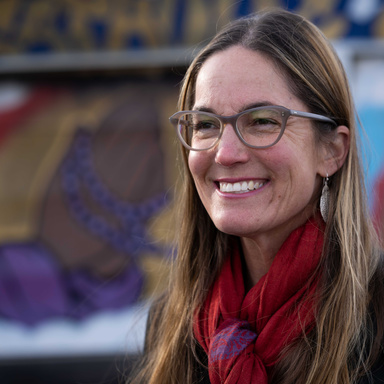Wednesday, March 8, 2023
Written by: Leslie Revaux
“What do you do for work?”
This question comes up often when meeting someone new. Most people have probably paused to consider how to explain clearly and concisely what they do to the person they are speaking with.
University of Iowa researchers and scholars are well-versed in communicating about their work through various academic mediums. This includes talks, grant proposals, papers, and manuscripts. These skills are required in order to secure funding, form collaborations, and climb the academic ladder.
Scholars develop these skills in graduate school and hone them over the course of a career. But until the last decade or so, academics have had received limited instruction on how to communicate about their area of specialization with people outside of academia.
“It’s critically important, perhaps now more than ever before, that academic institutions reach out to broad audiences to build support for research and creative discovery, and to promote understanding of the ways that this work reaps benefits for society as a whole,” said Marty Scholtz, vice president for research.
To support these efforts, the Office of the Vice President for Research launched its Communicating Ideas program in 2012. This small-group, interdisciplinary workshop is designed to offer tips and techniques for communicating about science and scholarship to general audiences, including the media.
Kanchna Ramchandran, Associate Research Scientist, Department of Internal Medicine
Inspired by her mother’s experience, Kanchna Ramchandran searches for ways to lift the cloudiness that can linger over a cancer patient’s mind, which is commonly known as chemo brain. As a neuroscientist, she searches for ways to find biomarkers that underline the fog so that it can be treated. She also uses a technique called transcranial magnetic stimulation (TMS), which sends electromagnetic pulses into the brain to jump-start brain cells into normal cognitive functioning.
“In the workshop, we teach communications principles that help researchers and scholars cut through the noise to deliver clear, memorable information to whomever they are talking to – from a 30-minute radio interview, to a 30-second sound bite for the evening news, and beyond,” said Charles Munro, a workshop facilitator, lecturer in the School of Journalism and Mass Communication, and former journalist and industry consultant.
The workshop includes a panel discussion with current and former television, radio, and print journalists who share tips for interviewing with the media. Workshop facilitators also provide guidance for framing a message for a general audience, using metaphors, analogies, and examples. All participants also work one-on-one with a coach — a former journalist or communications professional.
After the workshop, participants have the opportunity to step into the recording studio to film a 60-90 second video about their research and scholarship, with a non-academic audience in mind.

“This workshop, which I completed in my first year at Iowa, helped me think expansively about how to share my scholarship with broad audiences. The interdisciplinary nature of the program was so beneficial. Giving and receiving feedback from individuals outside of our area of expertise was eye-opening and allowed many of us to think anew about the language we were using to describe our work.”
- Kristy Nabhan-Warren, professor, V.O. and Elizabeth Kahl Figge Chair in Catholic Studies, and associate vice president for research
Nabhan-Warren has published five books, appeared on C-SPAN and Univision, published op-eds in national publications such as USA Today, and presented her work at venues ranging from prestigious conferences to local public libraries and nonprofits. In 2022, she was awarded the CLAS Outstanding Outreach and Public Engagement Award and the OVPR Communicating Ideas award for her publicly-engaged scholarship.